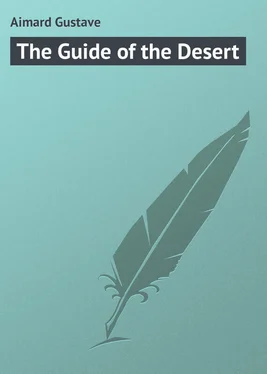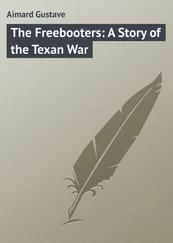Gustave Aimard - The Guide of the Desert
Здесь есть возможность читать онлайн «Gustave Aimard - The Guide of the Desert» — ознакомительный отрывок электронной книги совершенно бесплатно, а после прочтения отрывка купить полную версию. В некоторых случаях можно слушать аудио, скачать через торрент в формате fb2 и присутствует краткое содержание. Жанр: foreign_prose, на английском языке. Описание произведения, (предисловие) а так же отзывы посетителей доступны на портале библиотеки ЛибКат.
- Название:The Guide of the Desert
- Автор:
- Жанр:
- Год:неизвестен
- ISBN:нет данных
- Рейтинг книги:5 / 5. Голосов: 1
-
Избранное:Добавить в избранное
- Отзывы:
-
Ваша оценка:
- 100
- 1
- 2
- 3
- 4
- 5
The Guide of the Desert: краткое содержание, описание и аннотация
Предлагаем к чтению аннотацию, описание, краткое содержание или предисловие (зависит от того, что написал сам автор книги «The Guide of the Desert»). Если вы не нашли необходимую информацию о книге — напишите в комментариях, мы постараемся отыскать её.
The Guide of the Desert — читать онлайн ознакомительный отрывок
Ниже представлен текст книги, разбитый по страницам. Система сохранения места последней прочитанной страницы, позволяет с удобством читать онлайн бесплатно книгу «The Guide of the Desert», без необходимости каждый раз заново искать на чём Вы остановились. Поставьте закладку, и сможете в любой момент перейти на страницу, на которой закончили чтение.
Интервал:
Закладка:
CHAPTER V
O SERTÃO
On the 25th of June, 1790, about seven o'clock in the evening, a rather numerous troop of horsemen suddenly emerged from a narrow ravine, and began to ascend a steep path on the flank of a mountain forming the extreme limit of the Sierra di Ibetucata, situated in the province of São Paolo.
These horsemen, having traversed the Rio Paranapanema, prepared no doubt to cross the Rio Tietê, if, as the direction which they followed appeared to indicate, they were going to the territory of Minas Gerais.
For the most part well dressed, they wore the picturesque costume of sertanejos, and were armed with sabres, pistols, knives, and carbines. Their laços, rolled up, were hanging, attached by rings, to the right sides of their saddles.
We shall observe that the bolas – that terrible arm of the gaucho of the pampas in the Banda Oriental – is completely unused in the interior of Brazil.
These men, with their bronzed complexions, haughty bearing, boldly seated on their horses, their hands resting on their weapons, ready to make use of them, and their eyes constantly fixed on the underwood and the thickets in order to discover the route, and to guard against ambuscades, offered in the oblique and mild rays of the setting sun, in the midst of that majestic scene, a striking resemblance to those troops of Paulista adventurers who in the sixteenth and seventeenth centuries, appeared led by the finger of God to undertake bold expeditions, which were to give new countries to the mother city, and to finish by confining to their impenetrable forests the warlike and unsubdued tribes of the first inhabitants of the soil.
The horsemen of whom we are speaking were thirty in number, reckoning the servants charged with the mules loaded with baggage, and who, in case of attack, were to join their companions in the general defence, and were armed with fusils and sabres.
At some distance behind this first troop came a second, composed of a dozen horsemen, in the midst of whom was a palanquin closely shut, carried by two mules.
These two troops evidently obeyed the same chief, for when the first had arrived at the summit of the mountain, it stopped, and a horseman was sent to hasten the arrival of the second.
The men of the second troop affected a certain military air, and wore the costume of the soldados da conquista, which, at the first glance of a person accustomed to Brazilian manners, clearly showed that the chief of the caravan was not only a rich and powerful personage, but that his journey was surrounded by perils.
Notwithstanding the heat of the day, which was then closing, these soldiers sat firmly in their saddles, and carried, without appearing in any way discommoded by it, the strange accoutrement without which they never undertake an expedition – that is to say, the cuirass, named gibao de armas, a kind of greatcoat stuffed with cotton and quilted, which descends almost to the knees, and also covers and protects the arms better than any other armour from the long Indian arrows.
As when they followed the savages into the forests, they were obliged to abandon their horses, upon which they could not penetrate the virgin forests, they had at their side a kind of large blade, called facão, which was of use to them in cutting bamboos to open up a passage; they each had also an espingole, or a fusil without bayonet, which they ordinarily loaded only with large shot, as it was almost impossible to direct a ball with certainty in these inextricable masses of foliage, rendered thicker still by the strange disposition of the branches, and the entanglement of the bamboos.
These soldiers are much feared by the Indians and the runaway Negroes, whom they have a special mission to track and surprise.
They are much esteemed in the country on account of their courage, their sobriety, and their fidelity, whenever put to the test; thus the presence of a dozen of them in the caravan was a certain indication of the high position which the chief of the expedition occupied in Brazilian society.
The caravan stopped, as we have said, at the summit of the mountain. From that elevation there was a view spread before them, to a considerable distance, over a landscape of forests, of varied valleys, traversed by innumerable streams; but not a house, not a hut, was visible to animate this splendid and wild scene.
The travellers, little affected by the attractions of the magic panorama which was spread out before them, and moreover fatigued by a long journey through almost impracticable paths, while a torrid sun profusely poured its burning rays on their heads, hastened to instal themselves in their camp for the night.
Whilst some amongst them unloaded the mules and heaped up the baggage, others erected a tent in the midst of this improvised camp; the strongest made a heap of trees as a provisional intrenchment, and some others lit the fires intended for the cooking of the evening meal – fires which were to be kept up all night in order to keep off wild beasts.
When the camp was completely made, a horseman of haughty bearing, about twenty-eight or thirty years at the most, whose aristocratic manner, bold look and short manner of speaking, denoted the habit of command, gave the order for the palanquin, which up to that moment had remained at some little distance, surrounded by its escort, to approach.
The palanquin immediately advanced as far as the tent, and was opened. The curtain of the tent moved, and then fell back, without it being possible to know of what sex was the person whom the palanquin had enclosed, and who had just quitted it. The palanquin was immediately borne away. The soldier who had probably previously received strict injunctions, surrounded at a pistol shot the tent, to which they would allow no one to approach.
The chief of the caravan, after having assisted at the execution of the order he had given, withdrew under a somewhat smaller tent, erected at some paces from the first, and throwing himself on a seat, was soon absorbed in profound reflections.
This horseman, as we have said, was a man of twenty-eight or thirty years of age, with delicate and aristocratic features, of almost feminine beauty and delicacy. His countenance, gentle and affable at the first aspect, lost this appearance as soon as it was studied with care, to assume an expression of mocking and cruel wickedness, which inspired fear and almost repulsion; his large black eyes had a vague look which was rarely fixed, his mouth furnished with brilliant white teeth, surmounted by a fine black moustache, oiled with care, only half-opened to allow an ironic smile to escape from his lips, slightly raising their corners. Such as he was, however, to superficial eyes, he was an admirable horseman, full of nobility, and of a seductive bearing.
He had scarcely been twenty minutes alone under his tent, when the curtain of the tent was removed gently to give passage to a man who, after having assured himself by looking around, that the horseman of whom we have just given a sketch was quite alone, took two steps into the interior, and removed his hat respectfully.
This person formed to the first the most complete and the rudest contrast; he was still young, with muscular form and angular features – a base, mean, and cruel physiognomy, impressed with an expression of sullen wickedness; his forehead low and depressed, his eyes grey, round, deeply sunken, and considerably removed from each other, his nose long and hooked, his high cheekbones, his large mouth with flat lips, gave him a distant resemblance to a bird of prey of the least noble kind. His monstrous head, supported by a thick and short neck, was buried between two shoulders of great breadth, his awkward arms covered with enormous muscles, gave him the appearance of possessing extraordinary brutal force, the general aspect of which had something repulsive in it. This individual, whom it was easy at once to recognise as a mameluco [1] hybrid, wore the costume of the sertanejos.
Читать дальшеИнтервал:
Закладка:
Похожие книги на «The Guide of the Desert»
Представляем Вашему вниманию похожие книги на «The Guide of the Desert» списком для выбора. Мы отобрали схожую по названию и смыслу литературу в надежде предоставить читателям больше вариантов отыскать новые, интересные, ещё непрочитанные произведения.
Обсуждение, отзывы о книге «The Guide of the Desert» и просто собственные мнения читателей. Оставьте ваши комментарии, напишите, что Вы думаете о произведении, его смысле или главных героях. Укажите что конкретно понравилось, а что нет, и почему Вы так считаете.












